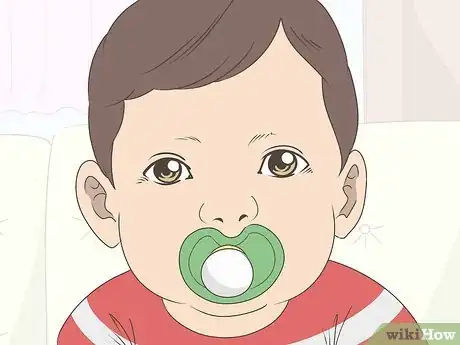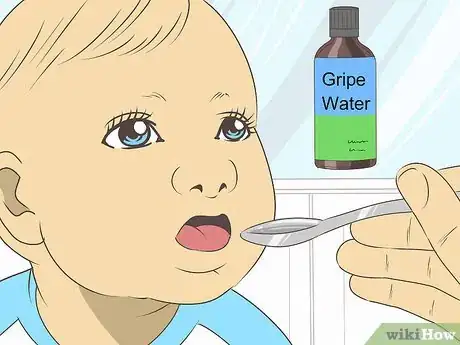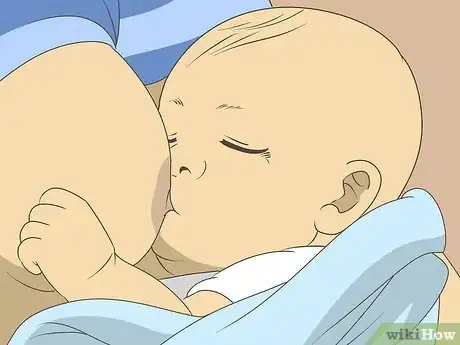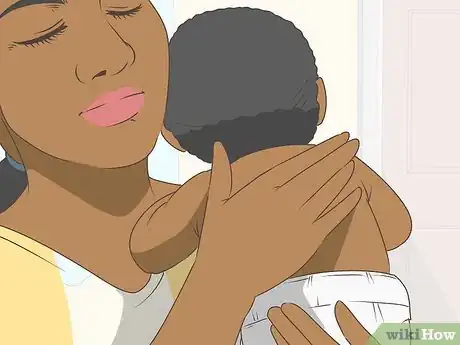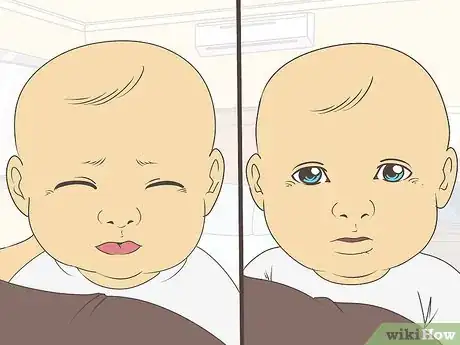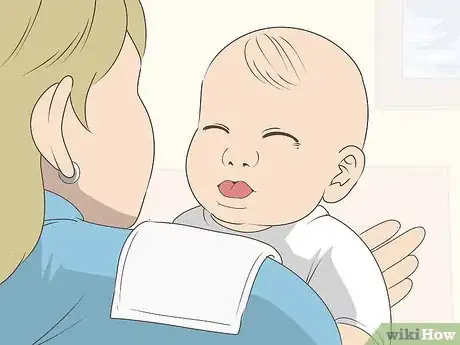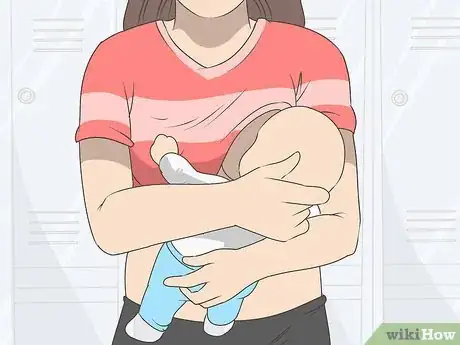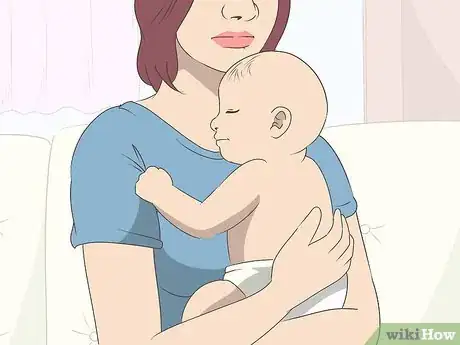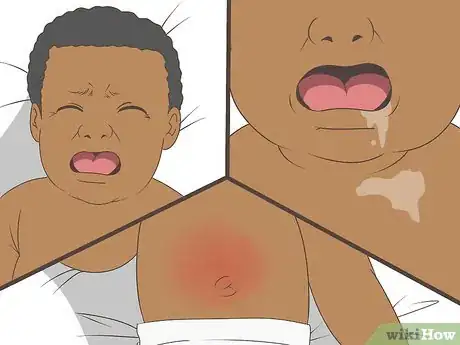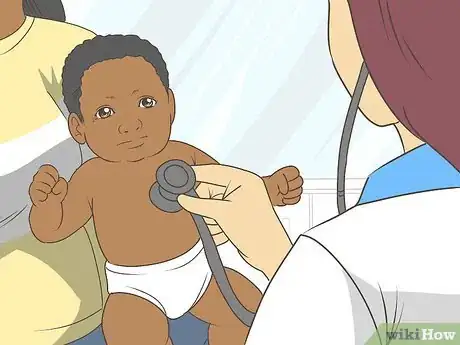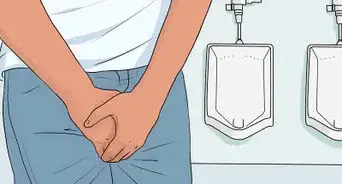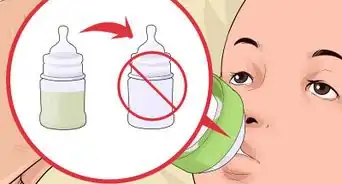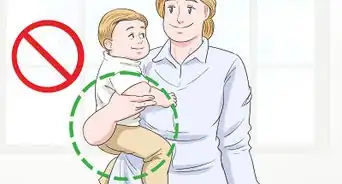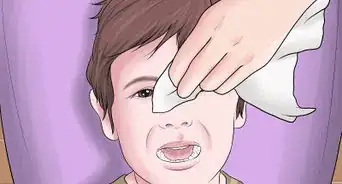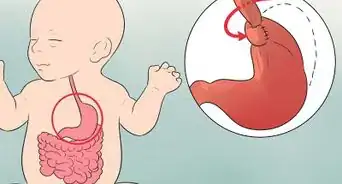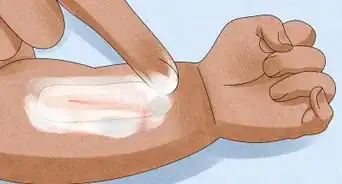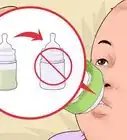This article was co-authored by Muhammad Khan, MD, MPH. Dr. Muhammad Khan is a Gastroenterologist, with over 10 years of experience. Dr. Khan specializes in Pediatric Gastroenterology, Hepatology, and Nutrition, and has a special focus in Therapeutic Endoscopy. He received his Bachelor’s, Master’s, and Doctorate of Medicine degrees from The University of Utah. Dr. Khan completed his residency training at Eastern Virginia Medical School, where he was inducted into the prestigious Alpha Omega Alpha honor society. He then completed his fellowship training at Lucile Packard Children’s Hospital at Stanford University. He is a Fellow of both the American Society of Gastrointestinal Endoscopy (ASGE) and the North American Society for Pediatric Gastroenterology, Hepatology, and Nutrition (NASPGHAN).
wikiHow marks an article as reader-approved once it receives enough positive feedback. This article received 11 testimonials and 86% of readers who voted found it helpful, earning it our reader-approved status.
This article has been viewed 1,882,878 times.
It's normal to get a little nervous if your baby is hiccuping. Don't worry, though! Hiccups are totally normal and harmless. Doctors recommend just waiting them out. If you want to speed up the process, there are several things you can try. Keep reading for lots of great ideas!
Steps
Expert Q&A
-
QuestionAre hiccups bad for newborns?
 Muhammad Khan, MD, MPHDr. Muhammad Khan is a Gastroenterologist, with over 10 years of experience. Dr. Khan specializes in Pediatric Gastroenterology, Hepatology, and Nutrition, and has a special focus in Therapeutic Endoscopy. He received his Bachelor’s, Master’s, and Doctorate of Medicine degrees from The University of Utah. Dr. Khan completed his residency training at Eastern Virginia Medical School, where he was inducted into the prestigious Alpha Omega Alpha honor society. He then completed his fellowship training at Lucile Packard Children’s Hospital at Stanford University. He is a Fellow of both the American Society of Gastrointestinal Endoscopy (ASGE) and the North American Society for Pediatric Gastroenterology, Hepatology, and Nutrition (NASPGHAN).
Muhammad Khan, MD, MPHDr. Muhammad Khan is a Gastroenterologist, with over 10 years of experience. Dr. Khan specializes in Pediatric Gastroenterology, Hepatology, and Nutrition, and has a special focus in Therapeutic Endoscopy. He received his Bachelor’s, Master’s, and Doctorate of Medicine degrees from The University of Utah. Dr. Khan completed his residency training at Eastern Virginia Medical School, where he was inducted into the prestigious Alpha Omega Alpha honor society. He then completed his fellowship training at Lucile Packard Children’s Hospital at Stanford University. He is a Fellow of both the American Society of Gastrointestinal Endoscopy (ASGE) and the North American Society for Pediatric Gastroenterology, Hepatology, and Nutrition (NASPGHAN).
Board Certified Gastroenterologist Baby hiccups are a natural occurrence and nothing to worry about. Sometimes, a baby will hiccup due to their developing nervous system.
Baby hiccups are a natural occurrence and nothing to worry about. Sometimes, a baby will hiccup due to their developing nervous system. -
QuestionDo hiccups mean baby is full?
 Muhammad Khan, MD, MPHDr. Muhammad Khan is a Gastroenterologist, with over 10 years of experience. Dr. Khan specializes in Pediatric Gastroenterology, Hepatology, and Nutrition, and has a special focus in Therapeutic Endoscopy. He received his Bachelor’s, Master’s, and Doctorate of Medicine degrees from The University of Utah. Dr. Khan completed his residency training at Eastern Virginia Medical School, where he was inducted into the prestigious Alpha Omega Alpha honor society. He then completed his fellowship training at Lucile Packard Children’s Hospital at Stanford University. He is a Fellow of both the American Society of Gastrointestinal Endoscopy (ASGE) and the North American Society for Pediatric Gastroenterology, Hepatology, and Nutrition (NASPGHAN).
Muhammad Khan, MD, MPHDr. Muhammad Khan is a Gastroenterologist, with over 10 years of experience. Dr. Khan specializes in Pediatric Gastroenterology, Hepatology, and Nutrition, and has a special focus in Therapeutic Endoscopy. He received his Bachelor’s, Master’s, and Doctorate of Medicine degrees from The University of Utah. Dr. Khan completed his residency training at Eastern Virginia Medical School, where he was inducted into the prestigious Alpha Omega Alpha honor society. He then completed his fellowship training at Lucile Packard Children’s Hospital at Stanford University. He is a Fellow of both the American Society of Gastrointestinal Endoscopy (ASGE) and the North American Society for Pediatric Gastroenterology, Hepatology, and Nutrition (NASPGHAN).
Board Certified Gastroenterologist It can, yes. When a baby's stomach is filled with food, it can put pressure on the top of the stomach, which can trigger a round of hiccups.
It can, yes. When a baby's stomach is filled with food, it can put pressure on the top of the stomach, which can trigger a round of hiccups. -
QuestionHow can hiccups be prevented?
 Muhammad Khan, MD, MPHDr. Muhammad Khan is a Gastroenterologist, with over 10 years of experience. Dr. Khan specializes in Pediatric Gastroenterology, Hepatology, and Nutrition, and has a special focus in Therapeutic Endoscopy. He received his Bachelor’s, Master’s, and Doctorate of Medicine degrees from The University of Utah. Dr. Khan completed his residency training at Eastern Virginia Medical School, where he was inducted into the prestigious Alpha Omega Alpha honor society. He then completed his fellowship training at Lucile Packard Children’s Hospital at Stanford University. He is a Fellow of both the American Society of Gastrointestinal Endoscopy (ASGE) and the North American Society for Pediatric Gastroenterology, Hepatology, and Nutrition (NASPGHAN).
Muhammad Khan, MD, MPHDr. Muhammad Khan is a Gastroenterologist, with over 10 years of experience. Dr. Khan specializes in Pediatric Gastroenterology, Hepatology, and Nutrition, and has a special focus in Therapeutic Endoscopy. He received his Bachelor’s, Master’s, and Doctorate of Medicine degrees from The University of Utah. Dr. Khan completed his residency training at Eastern Virginia Medical School, where he was inducted into the prestigious Alpha Omega Alpha honor society. He then completed his fellowship training at Lucile Packard Children’s Hospital at Stanford University. He is a Fellow of both the American Society of Gastrointestinal Endoscopy (ASGE) and the North American Society for Pediatric Gastroenterology, Hepatology, and Nutrition (NASPGHAN).
Board Certified Gastroenterologist Make sure to give your baby a good burping during feeding. You might also try switching to a vented baby bottle so your little one is only drinking milk and not air.
Make sure to give your baby a good burping during feeding. You might also try switching to a vented baby bottle so your little one is only drinking milk and not air.
References
- ↑ https://www.saintlukeskc.org/health-library/stuffy-nose-sneezing-and-hiccups-newborns
- ↑ https://health.clevelandclinic.org/heres-what-to-do-when-your-baby-has-the-hiccups/
- ↑ https://www.ucsfbenioffchildrens.org/education/your-baby-at-1-week
- ↑ Muhammad Khan, MD, MPH. Board Certified Gastroenterologist. Expert Interview. 24 August 2021.
- ↑ https://health.clevelandclinic.org/heres-what-to-do-when-your-baby-has-the-hiccups/
- ↑ Muhammad Khan, MD, MPH. Board Certified Gastroenterologist. Expert Interview. 24 August 2021.
- ↑ https://www.saintlukeskc.org/health-library/stuffy-nose-sneezing-and-hiccups-newborns
- ↑ https://health.clevelandclinic.org/heres-what-to-do-when-your-baby-has-the-hiccups/
- ↑ https://health.clevelandclinic.org/heres-what-to-do-when-your-baby-has-the-hiccups/
- ↑ Muhammad Khan, MD, MPH. Board Certified Gastroenterologist. Expert Interview. 24 August 2021.
- ↑ https://www.babycentre.co.uk/x1048439/how-can-i-get-rid-of-my-newborn-babys-hiccups
- ↑ https://health.clevelandclinic.org/heres-what-to-do-when-your-baby-has-the-hiccups/
- ↑ https://health.clevelandclinic.org/heres-what-to-do-when-your-baby-has-the-hiccups/
About This Article
To get rid of baby hiccups, try giving your baby something to eat, like applesauce, or breastfeeding them, which can help relax your baby's diaphragm so they stop hiccuping. Also, if your baby is old enough, you can give them some water to help combat the hiccups. To prevent hiccups from happening in the first place, try slowing down your baby's feedings by feeding them half as much, twice as often. Or, you can stop and burp your baby halfway through a feeding to slow things down. To learn how to tell if your baby has reflux, read on!
